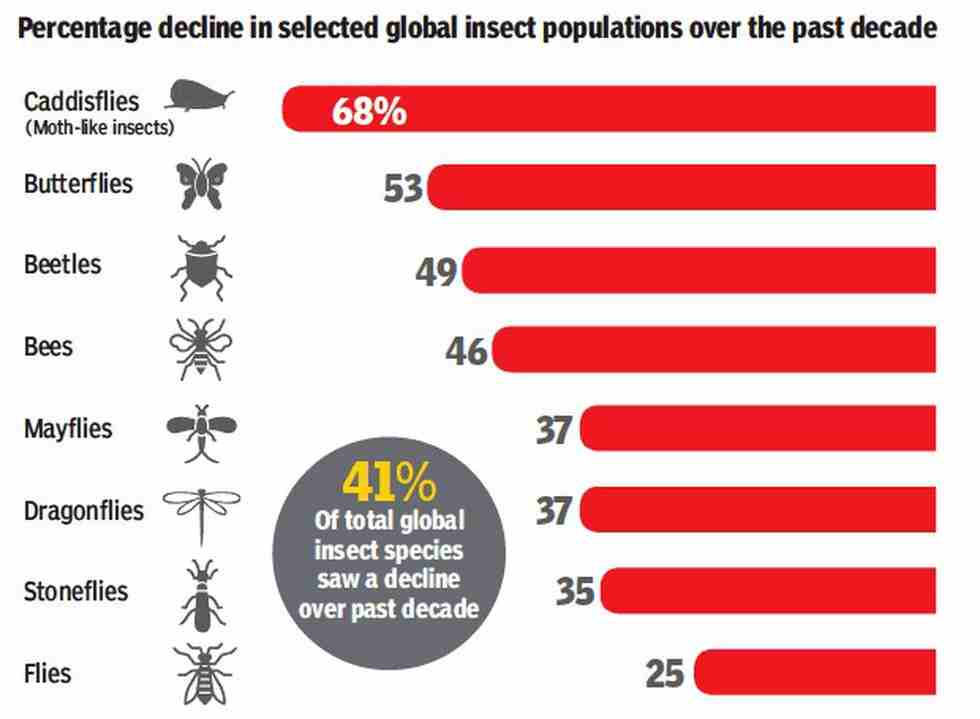scientists issue dire warning
INSECT COLONY COLLAPSE SYNDROME

by
JON QUEALLY
__________________________________________________________
Jon
Queally is managing editor for Common Dreams. Follow
him on Twitter: @jonqueally
Presented
in exclusive reporting by the Guardian’s environment
editor Damian Carrington, the findings of the new analysis, published
in the journal Biological Conservation, found that industrial
agricultural techniques—“particularly the heavy use
of pesticides”—as well as climate change and urbanization
are the key drivers behind the extinction-level decline of insect
populations that could herald a “catastrophic collapse of
nature’s ecosystems” if not addressed.
“If
insect species losses cannot be halted, this will have catastrophic
consequences for both the planet’s ecosystems and for the
survival of mankind,” report co-author Francisco Sánchez-Bayo,
at the University of Sydney, Australia, told the Guardian.
Sánchez-Bayo wrote the scholarly analysis with Kris Wyckhuys
at the China Academy of Agricultural Sciences in Beijing.
 Calling
the current annual global insect decline rate of 2.5 percent over
the last three decades a “shocking” number, Sánchez-Bayo
characterized it as “very rapid” for insects worldwide.
If that continues, he warned: “In 10 years you will have
a quarter less, in 50 years only half left and in 100 years you
will have none.”
Calling
the current annual global insect decline rate of 2.5 percent over
the last three decades a “shocking” number, Sánchez-Bayo
characterized it as “very rapid” for insects worldwide.
If that continues, he warned: “In 10 years you will have
a quarter less, in 50 years only half left and in 100 years you
will have none.”
Isn’t
this a bit alarmist? Anticipating that concern, Sánchez-Bayo
said the language of the report was intended “to really
wake people up,” but that’s because the findings are
so worrying.
Not involved
with the study, Professor Dave Goulson at the University of Sussex
in the UK, agreed. “It should be of huge concern to all
of us,” Goulson told the Guardian, “for insects
are at the heart of every food web, they pollinate the large majority
of plant species, keep the soil healthy, recycle nutrients, control
pests, and much more. Love them or loathe them, we humans cannot
survive without insects.”
As Carrington reports:
The planet is at the start of a sixth mass extinction in its
history, with huge losses already reported in larger animals
that are easier to study. But insects are by far the most
varied and abundant animals, outweighing humanity by 17 times.
They are “essential” for the proper functioning
of all ecosystems, the researchers say, as food for other
creatures, pollinators and recyclers of nutrients.
Insect
population collapses have recently been reported in Germany and
Puerto Rico, but the review strongly indicates the crisis is global.
The researchers set out their conclusions in unusually forceful
terms for a peer-reviewed scientific paper: “The [insect]
trends confirm that the sixth major extinction event is profoundly
impacting [on] life forms on our planet.”
Doug
Parr, the chief scientist for Greenpeace U.K., responded to the
reporting by saying these are the climate-related developments
that concern him most of all.
“I
spend so many hours a week concerned climate change,” he
said in a tweet linking to the story. “But this is the stuff
that worries me most. We don’t know what we’re doing,
not trying to stop it, [and] with big consequences we don’t
really understand.”
According
to Sánchez-Bayo, the “main cause of the decline is
agricultural intensification,” and he put special emphasis
on new classes of pesticides and herbicides that have been brought
to market over the last twenty years alongside a global surge
in industrialized monocultures. “That means the elimination
of all trees and shrubs that normally surround the fields, so
there are plain, bare fields that are treated with synthetic fertilizers
and pesticides,” he said.
As campaigners
worldwide intensify their collective demand that elected leaders,
governments, communities, and businesses do significantly more
to address the crisis of a warming planet and halt the destruction
of the Earth’s natural systems, journalist David Sirota
contrasted evidence of species loss—and the threat it contains—with
those voices who say something like a Green New Deal would somehow
be “too expensive” or disruptive to the status quo.